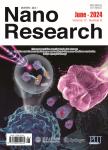Facile synthesis of intra-nanogap enhanced Raman tags with different shapes
作者机构:Department of Chemistry and BiochemistryThe Ohio State UniversityColumbusOhio 43210USA School of Biomedical EngineeringShanghai Jiao Tong UniversityShanghai 200030China
出 版 物:《Nano Research》 (纳米研究(英文版))
年 卷 期:2024年第17卷第9期
页 面:8415-8423页
核心收录:
学科分类:07[理学] 070205[理学-凝聚态物理] 08[工学] 080501[工学-材料物理与化学] 0805[工学-材料科学与工程(可授工学、理学学位)] 0702[理学-物理学]
基 金:supported by the National Institutes of Health award R01-GM109988 the financial support from the National Natural Science Foundation of China(No.82272054) Shanghai Jiao Tong University(No.YG2024LC09)
主 题:hot spot engineering surface enhanced Raman scattering intra-gap nanoparticles 4-nitrobenzenethiol
摘 要:Hot spot engineering in plasmonic nanostructures plays a significant role in surface-enhanced Raman scattering(SERS)for bioanalysis and cell ***,creating stable,reproducible,and strong SERS signals remains challenging due to the potential interference from surrounding chemicals and locating SERS-active analytes into hot-spot ***,we developed a straightforward approach to synthesize intra-gap nanoparticles encapsulating 4-nitrobenzenethiol(4-NBT)as a reporter molecule within these gaps to avoid outside *** made three kinds of intra-gap nanoparticles using nanorods,bipyramids,and nanospheres as cores,in which the nanorods based intra-gap nanoparticles exhibit the highest SERS *** advantage of our method is the ease of preparation of high-yield and stable intra-gap nanoparticles characterized by a short incubation time(10 min)with 4-NBT and quick synthesis without requiring an additional step to centrifuge for the purification of core *** intense localized field in the synthesized hot spots of these plasmonic gap nanostructures holds great promise as a SERS substrate for a broad range of quantitative optical applications.



